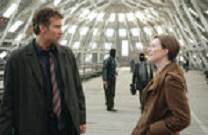|
|
||||
|
|
by Jeffrey Chen  Alfonso Cuarón is fast becoming one of my favorite working directors. He's one of the few who strongly involves kineticism in his movies. By moving his camera around and about his characters, he creates a strong sensation of space and location; when he combines this with his generally earthy production designs, his films give off the feeling of real lived-in realms. As a result, Cuarón's movies, which already show his ability to feel comfortable working in multiple genres, feel exciting and alive. This technique comes to stunning life in Children of Men, Cuarón's foray into near-future apocalyptic science fiction. The story is an intriguing premise -- humanity has freakishly lost the ability to reproduce and has thus destroyed itself in despair, with only Great Britain standing as the last bastion of civilization -- boiled down to a simple chase movie. But it benefits from Cuarón's visual virtuosity -- in his hands, it carries a jaw-dropping immediacy. The first thing you may notice is the extensive use of long single takes (or, possibly, multiple takes disguised as a single take, although the disguising, if any, is flawless). The camera often follows the main character, Theo Faron (Clive Owen), as he moves from location to location, lightly creating the suspense of a high-wire act. By focusing on Theo, Cuarón uses him as a spotlight that roves over the dystopian setting; we see in the background the damaged civilization, huddling masses, and detailed visual evidence of the depths to which humanity has sunk -- TV reports and people weeping about the recent murder of the world's youngest person, graffiti about "The Human Project," and the police rounding up "fugees," unwanted illegal immigrants who've snuck into Britain for shelter from the dangers outside. And yet we may be unprepared for an early action sequence that takes this single take method and kicks it into high gear. It starts in the inside of a vehicle, and that's all I'll want to give away. Suffice it to say that, after it's over, you'll be wondering how they staged it and where the cameraman had to be physically -- when you're not busy clenching your hands in utter suspense. Its incredible execution makes it a tough act to follow, but the movie courageously offers up more, from an initial getaway from a base of operations to a climactic combat-zone battle scene. Cuarón's methods greatly enhance the urgency and viewer immersion in a movie with a somewhat fragile set up. The science fiction idea of humans suddenly unable to reproduce is a solid, basic launching point, but the story also extrapolates mankind's reaction as horribly destructive. This is fairly acceptable, but it leads to the idea of a Britain that wants to keep the outsiders out, which then leads to the formation of terrorist revolutionaries who want to take the British government down. All this is done to set up the chase scenario -- a group of rebels led by Julianne Moore's character carry a secret, and Owen's character Theo eventually absconds with it, with the terrorist group in hot pursuit. Because of the way Children of Men is being marketed, it's actually no spoiler to give away the secret, which is the discovery of an actual young pregnant woman (Claire-Hope Ashitey). Though the overall circumstances surrounding and leading to the chase feel overthought and contrived, Cuarón is able to take advantage of the scenario to hone in clearly on the motifs he's interested in, namely the contrast between the hope that life represents and the despair of death and killing. He highlights it to the point of spiritual illumination (although whatever reverence he conveys is nicely counterbalanced with some good humor), and overall it's effective -- Theo in particular receives what might be considered a holy character arc as an ex-activist who had given up on fighting for his beliefs and now finds himself on a path to a transcendent redemption. In this movie, the miracle of life feels exactly how it ought to -- as a miracle. It's an earnest plea against the path to doom that humankind seems to be ignorantly traveling on, continually taking further for granted the value of life. And Cuarón's focusing eye, never looking away, makes sure we can see all of life breathing, heaving and gasping. (Released by Universal Pictures and rated "R" for strong violence, some drug use, and brief nudity.) Review also posted at www.windowtothemovies.com. |
||
|
© 2024 - ReelTalk Movie Reviews Website designed by Dot Pitch Studios, LLC |



